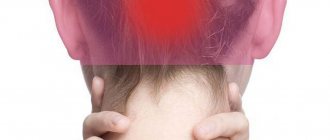Delirium tremens is a dangerous condition that can lead to death or serious mental pathology. According to statistics, chronic alcoholics experience delirium delirium approximately 7-10 years after the onset of addiction with systematic use of large doses of alcohol. Delirium tremens develops gradually, so it can be recognized at the initial stage and help can be called for in a timely manner. If you suspect delirium, you should immediately call a doctor.
Why does delirium delirium occur?
Ethanol has a detrimental effect on the central nervous system and brain cells. With prolonged use of alcohol, a person’s memory is impaired, tremors of the limbs appear, critical thinking and the level of intelligence decrease. Ethyl alcohol affects both physical health and mental health. Relatives and friends notice changes in the patient’s behavior and mood. His mood changes sharply, depression occurs, and suicidal tendencies may appear. The consequences of binge drinking are delirium delirium.
The main cause of delirium tremens is toxic damage to the central nervous system. The following factors contribute to the development of delirium:
- Abrupt withdrawal of alcohol, severe withdrawal syndrome. Alcohol delirium appears precisely after the alcoholic stops drinking. Withdrawal syndrome increases the load on the body. Signs of delirium appear approximately 2-5 days after stopping drinking alcohol.
- Burdened heredity. The presence of alcohol dependence in parents does not mean that the child will necessarily have problems with alcohol. But the likelihood of developing severe alcoholism increases.
- Cavity operations. Any surgical intervention is stressful for the body. After surgery, the person is weakened, and the likelihood of developing severe complications and disorders due to alcohol consumption increases.
- Binges. The longer and more a person drinks, the greater the chance of experiencing delirium delirium.
Delirium tremens often occurs in alcoholics at stage 3 of addiction. If a person has already experienced several attacks of delirium, we can talk about the appearance of an atypical form, which in its symptoms resembles schizophrenia.
It is worth remembering that this condition is life-threatening and does not go away on its own. If delirium tremens occurs, the patient must be immediately hospitalized and undergo a detoxification procedure.
Literature:
- Gulyamov, Minkhozh Gulyamovich. Delirium tremens [Text]: (Clinic and some issues of pathogenesis) / M. G. Gulyamov, I. R. Khasanov, V. F. Kolomiets; Ed. acad. G. V. Morozova. - Dushanbe: Irfon, 1976. - 213 p. : ill.; 22 cm.
- Clinic and treatment of alcoholic delirium [Text]: Method. recommendations / Ministry of Health of the RSFSR; [Comp. A.G. Goffman, V.I. Begunov and V.P. Diaghilev]. — Moscow: [b. i.], 1978. - 34 p.; 21 cm.
- Emergency diagnosis and methods of relieving alcoholic delirium, withdrawal syndrome and convulsive paroxysms: Method. recommendations / Kharkiv. Research Institute of Neurology and Psychiatry; [N. I. Protasevich and others]. - Kharkov: B. i., 1988. - 13 p.; 22 cm.
- Slutskin, Eduard Vladimirovich. Clinic and treatment of atypical forms of alcoholic delirium: dissertation ... Candidate of Medical Sciences: 14.00.18 / Slutskin Eduard Vladimirovich; [Place of defense: Federal State Institution "State Scientific Center for Social and Forensic Psychiatry"]. - Moscow, 2005. - 137 p. : 24 ill.
Stages of alcoholic delirium
This condition develops in stages, over 2-3 days. It is possible to detect delirium tremens at the initial stage and provide timely assistance to the patient. Alcoholic delirium occurs in 3 stages:
- First, the patient exhibits signs of severe intoxication . He experiences nausea, vomiting, and speech becomes confused and incoherent. The limbs tremble, it is difficult for him to control his movements, and convulsions are also possible.
- For the next couple of days, the person sleeps poorly or cannot sleep at all. His anxiety increases, panic appears, unreasonable fears appear, his eyes turn red. He can tell his relatives that he has a presentiment of terrible events, his own death, etc. At the second stage, visual and auditory hallucinations already appear.
- The peak of delirium occurs approximately 3-4 days after quitting alcohol. A person hallucinates , does not perceive reality, he communicates only with imaginary people, creatures, he can feel touch, insects crawling on his skin. This is the most difficult and life-threatening stage, which requires immediate help.
Acute psychosis is especially dangerous for the health and life of the patient. You should consult a doctor as soon as you notice signs of delirium in a person. Delirium tremens has several varieties, but they all develop gradually. At first there is simply panic, and then hallucinations. With occupational delirium, a person begins to perform any activities related to his work, without realizing that he is at home.
The duration of the binge plays a big role. The breakdown products of ethyl alcohol destroy neural connections. The more a person drinks, the more pronounced the consequences will be.
Symptoms of delirium tremens
Only a doctor can help a person in such a situation. If you know the signs of delirium tremens, you can call an ambulance in time. It is easier to restore the patient’s mental state in the first stage of delirium. You can notice it by increasing anxiety and sudden mood swings. A person can go from joy and euphoria to deep depression in a minute.
Signs of severe alcoholic delirium include:
- Inability to move normally. The person experiences such severe weakness that he cannot stand up on his own.
- Hyperthermia. The patient begins to have a fever, the temperature rises to 40 degrees. Fever may be accompanied by shortness of breath.
- Coordination problems. A strong tremor appears, and it is difficult for the patient to maintain an even gait.
- Strong excitement. A person cannot concentrate, does not perceive other people’s speech, does not perceive reality.
Symptoms are constantly increasing. Panic increases, limbs tremble more strongly, hallucinations become more obvious. If a person is not treated, the symptoms will intensify and the condition will worsen every hour.
Delirium can occur differently in men and women. There is no clear single symptomatology. How delirium tremens will manifest itself and proceed depends on many factors, for example, the presence of chronic diseases and congenital mental disorders.
Delirium tremens and hallucinosis should not be confused. In the second case, the patient can see objects that do not exist in reality, hear voices, but still contacts others. This condition can resolve on its own and is much less likely to lead to the death of the patient. During delirium, the patient is completely disconnected from reality. He is in his own world and does not react to what is happening around him.
Consequences
Typically, alcoholic delirium aggravates all chronic diseases a person has. If he had stomach problems, pain and heartburn will appear. Asthmatics begin to choke. The patient's condition can quickly become serious , so you need to get the patient to the clinic as quickly as possible. Treatment is carried out only under the supervision of doctors.
The severe consequences of delirium are:
- Liver and kidney failure;
- Disorders of the cardiovascular system;
- Swelling of brain tissue;
- Chronic mental disorders.
Delirium often leads to suicide and various crimes. Hallucinations can provoke thefts and murders. A person with delirium may harm themselves or family members.
Some effects of delirium tremens are irreversible . For example, if a person shows signs of alcoholic neuropathy (numbness and muscle pain), this can lead to nerve damage that may not fully recover.
Alcohol intoxication leads to damage to internal organs and metabolic disorders. After some time, the body begins to suffer from severe dehydration, which intensifies the painful symptoms.
Threat to life
Depersonalization occurs, loss of connection with reality and the outside world. Physically manifests itself in convulsions, severe dilation of the pupils.
Gradually, cerebral edema develops - a condition in which the patient falls into a coma with a risk of death.
The duration of delirium tremens is life-threatening – up to 5 days. It all depends on how quickly the patient receives qualified assistance. An alcoholic will either be cured or die if he does not see a doctor in a timely manner. Delay in treatment leads to a person’s disability – brain damage is irreversible.
Even after therapy, if help was not provided in a timely manner, the person may remain disabled with limited physical capabilities and mental disorders.
Treatment methods
Lack of treatment is very dangerous. Delirium does not go away on its own . Without medical help, a person may remain permanently mentally ill or die. The patient must be constantly monitored until complete recovery. If the patient's condition is critical, the patient is placed in intensive care.
Treatment for alcoholic delirium is as follows:
- First, a detoxification procedure is carried out. The patient is given a drip with a glucose solution, vitamins and various drugs (to normalize the functioning of the heart, liver, kidneys, and nervous system) to speed up the removal of breakdown products of ethyl alcohol from the blood.
- The patient is provided with complete rest. They give him sedatives and sleeping pills so that he can rest. If the patient shows aggression, he needs to be fixed for a certain period of time.
- Symptomatic therapy is also provided to eliminate the consequences of delirium. The patient is given drugs to restore liver cells, strengthen blood vessels, and improve blood circulation.
- The patient is constantly monitored, blood pressure and temperature are measured, and emergency assistance is provided if his indicators worsen.
- Consultation with a psychiatrist is required. To eliminate aggression, anxiety, and hallucinations, the patient is given psychotropic drugs. The duration of treatment depends on the severity of the person’s condition.
Treatment is carried out in a bright room. The light is left on even at night, as darkness and twilight can intensify hallucinations. It is advisable to eliminate the root cause of delirium – alcoholism. Treatment options for addiction are discussed with the patient. The occurrence of delirium tremens is a very alarming sign. If the patient continues to drink, the attacks will recur and intensify. You need to overcome the bad habit and turn to specialists. Long-term binge drinking is life-threatening and can lead to serious damage to internal organs, cirrhosis, stroke and heart attack.
There is no need to waste time and wait for the patient to come to his senses. The sooner he is taken to the clinic, the less likely he is to develop complications.
Mandatory procedures
In most cases, patients with delirium tremens are taken to a psychiatric hospital, where special treatment is provided. This is also necessary so that he cannot harm himself (if the cloudiness occurs, a person may even jump out of the window) or other people. In order for the symptoms to completely subside, careful treatment under constant supervision is required.
First of all, patients are given drugs that stop attacks (sibazon solution, sodium hydroxybutyrate, etc.). Then the body is detoxified, the remaining alcohol is removed from the blood, breathing is stabilized and, with the help of special tranquilizers, drugs and vitamins, the water-electrolyte balance is normalized and metabolism is restored.
The main task of doctors is to suppress psychotropic disorder and restore normal sleep in the patient.
Is it possible to cure a sick person at home?
The only thing loved ones can do to help a person with delirium tremens is to call a doctor as quickly as possible. Suggestion and folk methods will not help in this case. You cannot disturb the patient or slap him in the face so that he comes to his senses. You shouldn't shout and prove to him that he has schizophrenia. At best, the patient will not perceive the information.
It is advisable not to let the patient go outside and constantly monitor his behavior until the doctors arrive. In this state, he can harm himself, get lost or freeze. Self-medication can be dangerous if you give drugs to a patient without consulting a doctor. An overdose of sleeping pills or sedatives will only worsen the situation. If you do give a patient a sedative, read the instructions carefully first and do not exceed the recommended dosage.
Despite the fact that delirium occurs against the background of withdrawal syndrome, the patient should not be given alcohol. This will not help return him to a normal state, but will only complicate the detoxification procedure for doctors, since the IV is placed on the condition that there is no alcohol in the stomach.
Giving water to a person with delirium is also useless. You can give him something to drink to reduce the effects of dehydration, but in small portions. Large amounts of water will cause vomiting.
Herbal decoctions will calm you down a little, but will not solve the problem completely. You can give an infusion of yarrow, wormwood, but not alcohol tinctures. First you need to make sure that the patient does not have an allergic reaction to these herbs.
First aid
The disease tends to last from 3 to 7 days (in some cases longer). At the first occurrence of an open attack of delirium tremens, the patient must be given proper assistance. You should not immediately try to treat it; before doing so, it is necessary to remove the patient from an excited state.
First aid for an attack of delirium tremens consists of the following actions : the alcohol addict is put to bed, stopping all attempts to get up. If the clouding is severe, that is, the patient’s behavior is violent, and he poses a threat to himself and others, then it is worth resorting to tying up. It is necessary to urgently call a doctor. Trying to deal with a squirrel yourself without proper experience is extremely undesirable.
The further state of health is determined by the treatment of this clouding itself. The patient needs a lot of fluids and coolness. If it is not possible to put it under a cold shower, you can limit yourself to wiping it with a wet cloth. Sedatives (for example, piracetam, diphenhydramine) will be beneficial. In this condition, the patient must first of all be reassured.
Calm can also come through kind words. There is no need to quarrel with the squirrel's victim: this will definitely not help him. Treat him with understanding: everything he says or does happens unconsciously.









